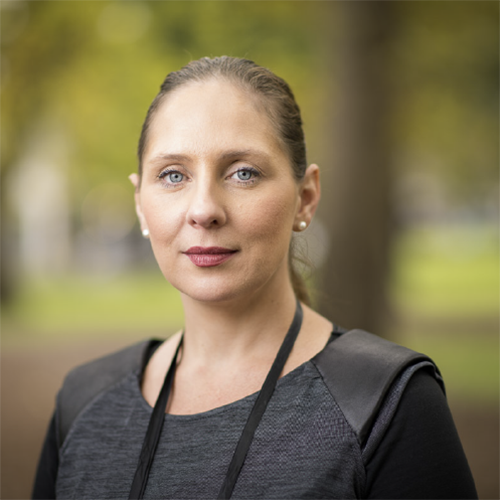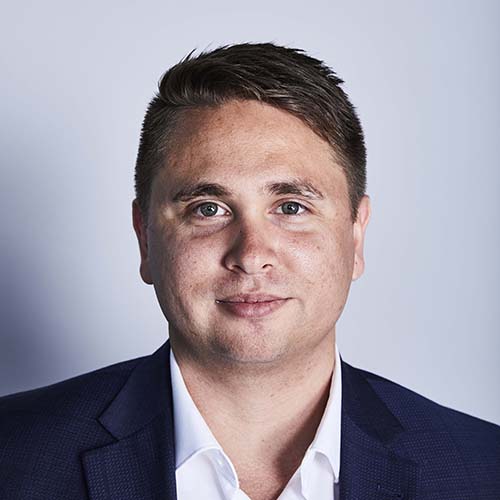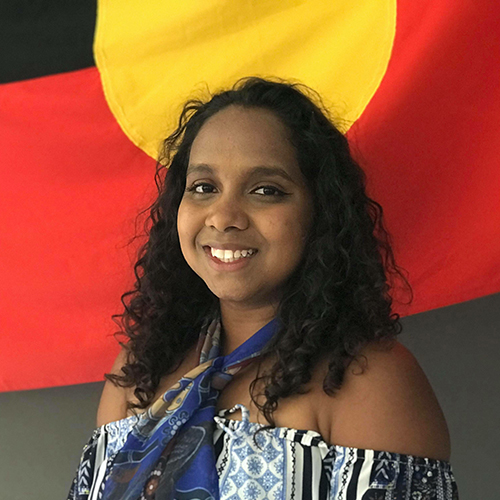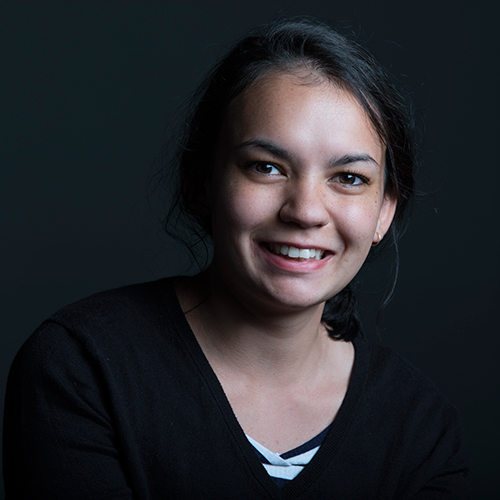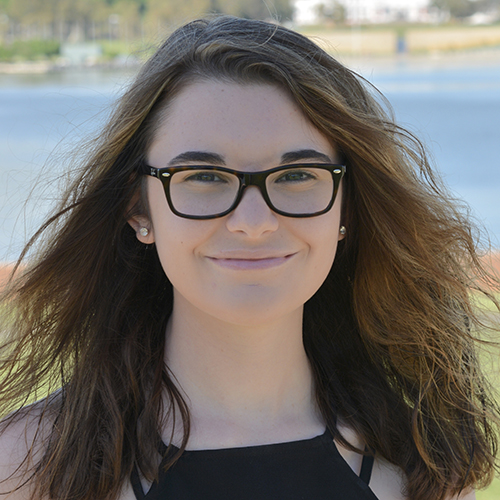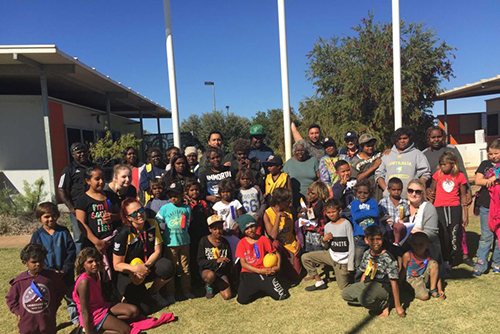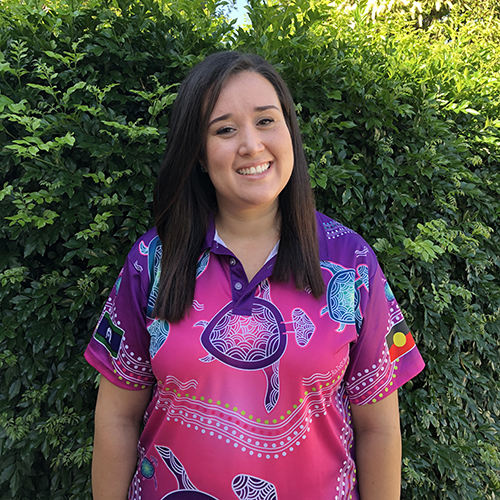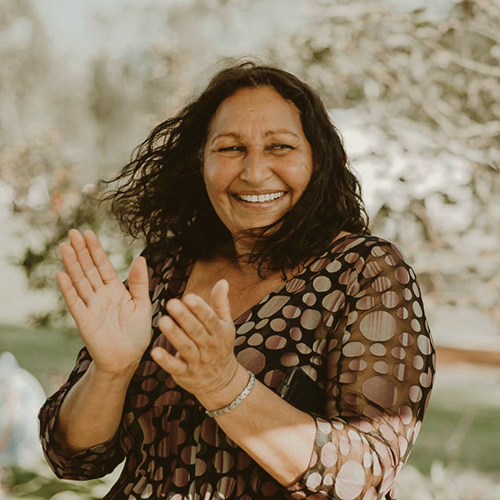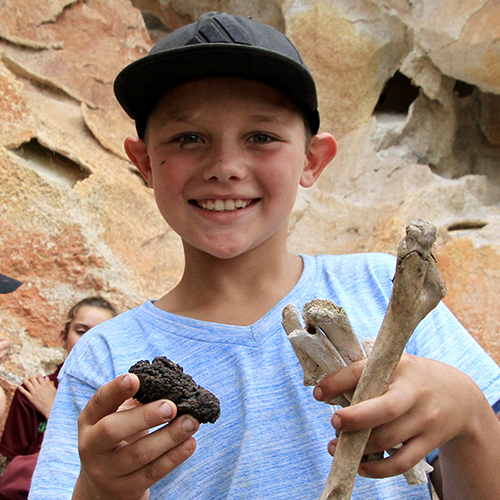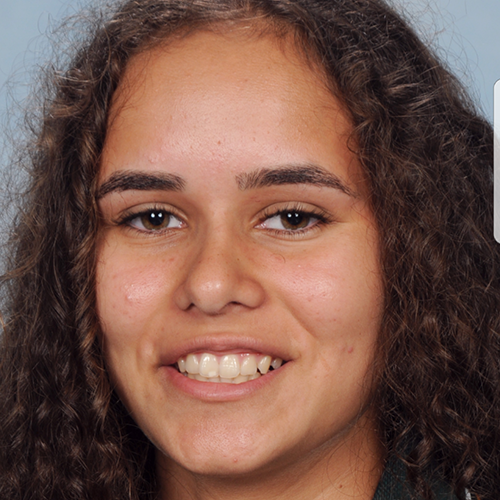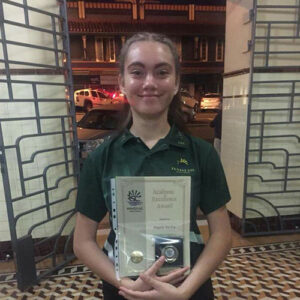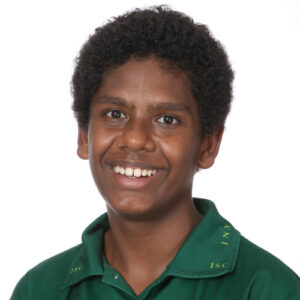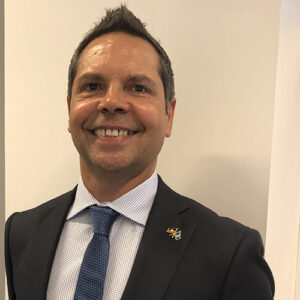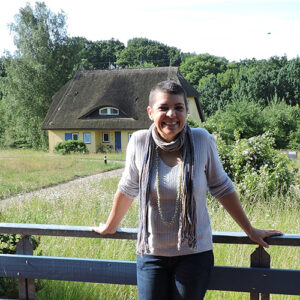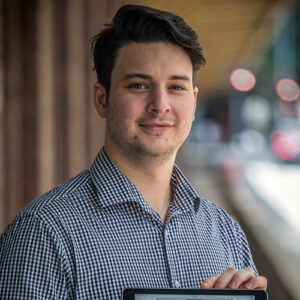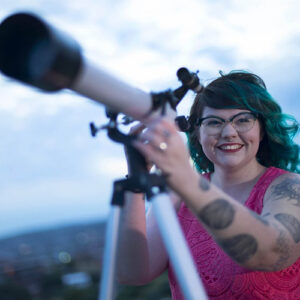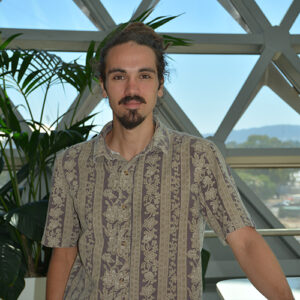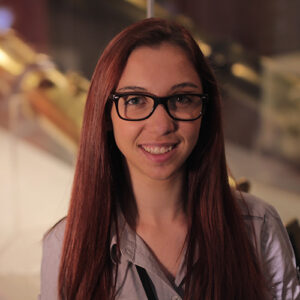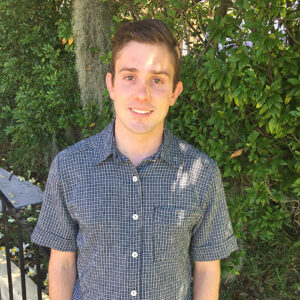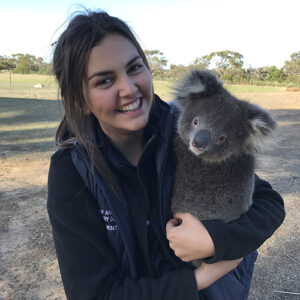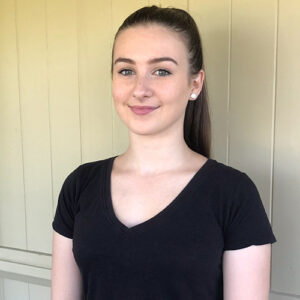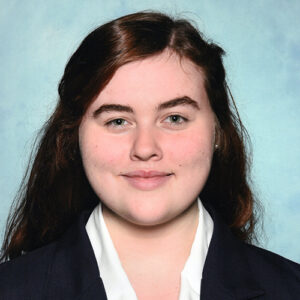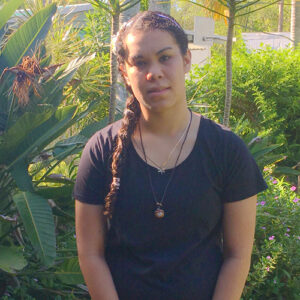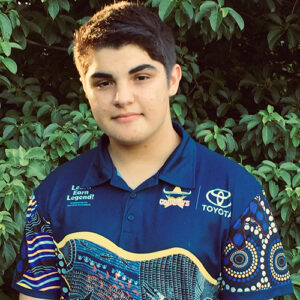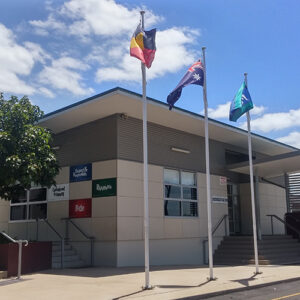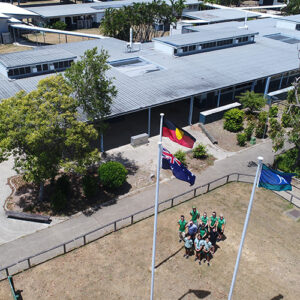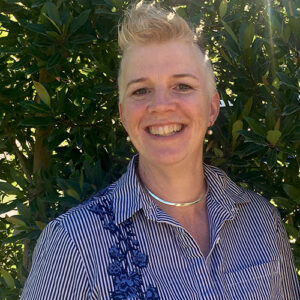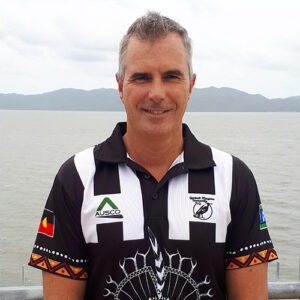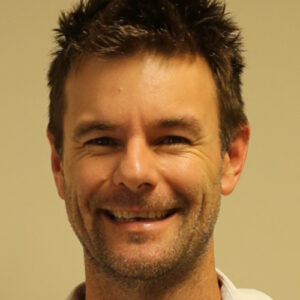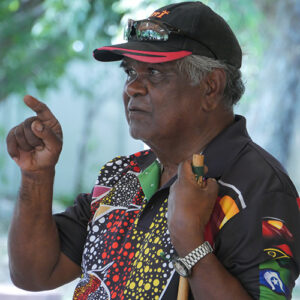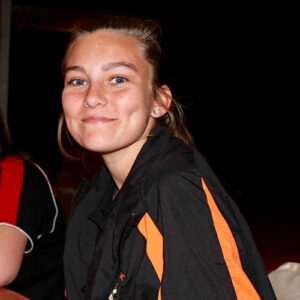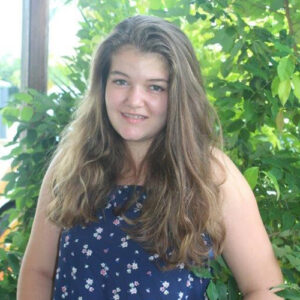2017 Indigenous STEM Awards Winners and Finalists
The 2017 Indigenous STEM Awards were announced in March 2018 at Wiluna Remote Community School in Western Australia.
The Aboriginal and Torres Strait Islander STEM Professional Awards
STEM Professional Career Achievement Award – Winner
Dr Misty Jenkins
Dr Misty Jenkins is a Gunditjmara woman, who grew up in regional Victoria. Misty holds a Bachelor of Science with First Class Honours from the University of Melbourne, and a PhD in immunology. She was awarded the prestigious NHMRC CJ Martin Fellowship to support her postdoctoral study at the University of Cambridge with Professor Gillian Griffiths. Her research theme that still continues today is killer lymphocytes, a subset of white blood cells that protect our bodies from viruses and cancer. In 2016, she was recruited to the Walter and Eliza Hall Institute to establish her first independent laboratory. In recognition of her research excellence, she has won numerous awards and funding support including a prestigious University of Cambridge College Fellowship, L’Oreal for Women in Science Award, Tall Poppy of the Year 2015, and in 2016, she was awarded the Westpac/Australian Financial Reviews Top 100 Women of Influence Award. Misty is passionate and very active in raising public awareness of the importance of medical research, advocating gender equity in science, and contributing to National Indigenous affairs.
STEM Professional Early Career Award – Winner
Dean Foley
Dean Foley
Dean Foley is a proud Kamilaroi Man who grew up within the Aboriginal community in Gunnedah, NSW. He is the founder of Barayamal, a 100 per cent Indigenous owned and managed charity, an Industry Mentor at Griffith University, founder of the Indigipreneur Podcast and Give Backathon, and ran Australia’s first ever Indigenous Start-up Weekend. Before going into business, Dean served five years in the Royal Australian Air Force. In June 2017, he organised an Indigenous Youth Coding workshop for 20 Indigenous students from Capalaba State College before founding CoderDojo First Nations – a network of coding clubs aimed at Indigenous Australians in collaboration with global kids coding initiative CoderDojo. Dean is passionate about inspiring and empowering Indigenous Youth with coding skills, confidence and opportunities to achieve their dreams and create a better world for all who live in it. By empowering Indigenous Youth with coding skills, confidence and opportunities to achieve their dreams, Dean believes we can Close the Gap between Indigenous and non-Indigenous Australians.
The Aboriginal and Torres Strait Islander Student STEM Achievement Awards
Tertiary/Undergraduate Student Award – Winner
Shailyn Isaac
Shailyn Isaac
Shailyn Isaac is a student at the University of Western Australia studying a Bachelor of Science (Anatomy and Human Biology) and is also a member of the UWA Anatomy Club and WA Student Aboriginal Corporation. Shailyn is an ambassador for Shenton House, School of Indigenous Students at University of Western Australia, she also tutors and mentors high school students carrying out their secondary education whilst residing at Aboriginal hostels based around Perth. In 2017, she attended the STEMM Careers in a Changing World conference, Connecting Health Outcomes to Culture event and the Rural Health and Medicine Seminar. Coming from an Aboriginal Community in the Kimberley region, Shailyn’s aspiration is based on the dreams of her past and present elders to one day have their own doctor based in community. She hopes to empower her home community, as well as other remote Aboriginal communities. Shailyn is pursuing medicine to become a rural health doctor in order to improve health equality and outcomes for Aboriginal and Torres Strait Islander peoples.
Secondary Student Award – Winners
Kayla Pattel
Kayla Pattel
Kayla Pattel is a Year 12 student at Tullawong State High School in Queensland. She is a school leader, part of the school’s STEM Academy and is in the Robotics club. In 2016, she was selected for and attended the Aboriginal Summer School for Excellence in Technology and Science (ASSETS). In 2017 Kayla completed an initial work placement with Boeing Defence before being the only secondary student to join a Boeing Defence Australia project for an extended placement over three weeks in January 2018. She has also participated in the Health Science Camp, Spark Engineering Camp, QUT Robotics Open Day and SPARQ-Ed Dynamic Tumour Heterogeneity in Melanoma Camp at the University of Queensland. Kayla hopes to study Neuromorphic engineering after high school.
Jessica Storrar
Jessica Storrar
Jessica Storrar is a student at Gungahlin College in the Australian Capital Territory. She is passionate about STEM and currently undertakes an extension course in biodiversity at the Australian National University to assist with the science honours program she is currently participating in at her school. In 2016, she attended the Aboriginal Summer School for Excellence in Science and Technology (ASSETS) and won the Engineering Games held by Australian National University. She has also competed in the Australian Science Competition, Big Science Competition, ICAS Science Competition and the Australian National Chemistry Quiz. Jessica also successfully completed a silver CREST project with CSIRO where she investigated the effects of hand sanitiser ingredients on different bacteria. She recently completed a work placement at Canberra Hospital where she observed work occurring in the orthopaedic, cardiovascular and urology departments, additionally interacting with patients and families. Jessica hopes to pursue medicine after high school with a particular interest in surgery.
School Award – Winner
Wiluna Remote Community School
Wiluna Remote Community School
Wiluna Remote Community School is situated on the edge of the Western Desert region of Western Australia. It has been involved in the Science Pathways for Indigenous Communities Program since 2016. Science and traditional knowledge are used as vehicles to develop academic knowledge, as well as competency in English as an Additional Language/Dialect and cross-cultural communication. Teachers apply an inquiry-based learning approach to meet the learning, cultural and engagement strengths of their mostly Martu students. Each term, there are weekly two-way science focused walks, bush trips and camps. The school has forged partnerships with a range of key stakeholders in the area including Traditional Owner Groups from Wiluna who manage the Matuwa Kurrara Kurrara Indigenous Protected Area and the Biriliburu IPA with administrative and logistics support from Desert Support Services to further engage students in the inquiry process. Other groups include BirdLife WA and other wildlife researchers. In 2015, the school worked closely with Traditional Owners and Indigenous Community members and linguists to develop a Martu Cultural Calendar which sets out phenomena related to weather, plants, animals and people that occur in each season. In 2016 and 2017, it attracted funds to develop book resources to complement the Calendar. The school has recently taken over the old TAFE site and now offers Certificate I and II in Conservation and Land Management and Automotive for upper secondary students and Martu Rangers. These certificates capitalise on the school’s science inquiry approach and Bush Rangers program, building towards employment opportunities for students as local rangers.
Teacher Award – Winner
Camila Zuniga-Greve
Camila Zuniga-Greve
Camila Zuniga-Greve is a classroom teacher at Heatley State School in Queensland. She is an active participant of the PRIME Futures Program. Camila is passionate about promoting and embedding Indigenous perspectives in all areas of her teaching, and works tirelessly to engage other staff in doing the same. She has developed strong ties with elders and members of the local community and utilises their knowledge and experience when possible. Her passion for promoting high aspirations for Indigenous students is also reflected in her involvement with Junior AITSIAP groups and annual competitions. Camila co-presented at the state-wide Indigenous Education conference in July, sharing school practices that promote an EATSIPS approach.
STEM Champion Award- Winner
Fifi Harris
Fifi Harris
Felicity (Fifi) Harris is a Wangkatja/Tjupan woman from Leonora Western Australia. She is an Aboriginal and Islander Education Officer (A.I.E.O) and Two-way Language educator at Leonora District Highschool in the Goldfields region of Western Australia where she has worked for 25 years.
Fifi runs the Department for Biodiversity, Conservation and Attractions Bushranger Program at the school, engaging students in on-country environmental activities. She is a passionate advocate for the sharing and intergenerational transfer of indigenous knowledge and provides leadership at the school to integrate student’s local language and culture alongside Western science into school plans, teaching practice and regular community events.
The Aboriginal and Torres Strait Islander Student Science Award – Winners
Boyden George
Boyden George
Boyden George is a primary school student from Leonora District High School in Western Australia, 840km north east of Perth and 240km north of the largest outback town, Kalgoorlie. Boyden has a big love for everything outdoors. His hobbies include gold prospecting, animals, motorbike riding, sport, fossicking for rocks, family bush days, camping, fishing and hunting. He is passionate about On-Country learning and recently took part in an investigation into the ecology and behaviour of the Walawuru (Wedge Tailed Eagle), an iconic species in Leonora from a scientific and cultural perspective.
In September 2017, whilst participating in a program called ‘bush blitz’ he found an interesting spider and went to great lengths to ensure that it was photographed. When it was submitted for verification via the Questagame biodiversity program, the expert advised it was likely an undescribed species. Boyden’s school principal has told him that he is ‘a bit famous’. He is a great role model for his two younger sisters, is very determined and sets very high goals for himself.
Willow Wells
Willow Wells
Willow Wells is a fourteen-year-old student at Thuringowa State High School in Queensland. She is a proud Kunja girl from South West Queensland. Her interest in STEM started after completing the Inquiry for Indigenous Science Students (I2S2) program. She took part in an excursion to James Cook University to conduct a guided inquiry into the effects of burning different types of fuel on burn temperature and resulting carbon emissions.
In 2017, with the Aboriginals and Torres Strait Islanders in Marine Science (ATSIMS) program, Willow attended trips to the Australian Institute for Marine Science, engagement sessions at James Cook University with experts in molecular, environmental and marine science, and a four-day trip to Orpheus Island Research Station where she participated in activities relating to the tagging of turtles. She attended information sessions on the cause and impacts of coral bleaching and the effects climate change has on the coral and marine life. Willow has also been successful in her application to be a participant in the STEM Girl Power Camp for 2018 and has also applied for Thuringowa State High School’s istem program that integrates STEM in the curriculum and allows connection to industry and tertiary institutions to allow students to complete year-long independent investigations to solve real-world problems with STEM solutions.
The Aboriginal and Torres Strait Islander Student Maths Award – Winners
Angela Barley
Angela Barley
Angela Barley is a 14 year old student who attends Innisfail state college in Far North Queensland.
In 2017 she attended the Inspire U STEM camp in Brisbane and has a developed clear career path with the help of this camp. She hopes to study forensic science at the University of Queensland. Angela is proud to be studying maths acceleration in 2018. She is a proud descendant of both the Quandamooka and Wiradjuri tribes and has been selected to be an indigenous leader for her school in 2018. Angela also loves playing Netball and Rugby League.
Russell Sands
Russell Sands
Russell Sands lives in Innisfail, a town of about 7500 people in Far North Queensland. Russell has been a member of the accelerated Mathematics and English program while he has been at Innisfail State College. Outside of school Russell enjoys hanging out with his friends. Currently, Russell is enjoying studying a Physics & Chemistry subject that will lead him towards this area in his senior years.
STEM Professional Career Achievement Award – Finalists
Dr Christopher Lawrence
Dr Christopher Lawrence
Dr Christopher Lawrence is a Noongar person originally from Perth. He is an Associate Professor in the School of Software and is the Head of the Centre for Indigenous Technology Research and Development in the Faculty of Engineering and IT at the University of Technology Sydney (UTS). Dr Lawrence and his team at UTS provide support and mentoring to 25 Aboriginal and Torres Strait Islander students currently enrolled in information technology or engineering. He was the first Indigenous academic to be appointed at a professorial role in any Faculty of Engineering and IT in Australia. In 1999, he was appointed Chair to the National Indigenous Australians Sexual Health Strategy and was a ministerial appointment to the National Australian HIV/AIDS Strategy 1999-2001. Between, 2003 and 2005, Dr Lawrence completed a masters in HIV/AIDS Epidemiology through the National Centre in Epidemiology and Population Health (ANU). In 2016, he was awarded an Indigenous Discovery grant funded by the Australian Research Council to explore how technology can help close the gap for Indigenous Australians. The title of his project is called #thismymob: Digital land rights and reconnecting Indigenous communities.
Dr Emma Lee
Dr Emma Lee
Dr Emma Lee is a senior trawlwulwuywoman of tebrakunna country (north-east Tasmania). Her professional services over the last 25 years have been in the fields of Indigenous affairs, land management, natural and cultural resources, regional development, policy and governance of Australian regulatory environments. For the last three years, she has been a co-lecturer in Environmental Studies, University of Tasmania. In 2016, Dr Lee was a recipient of an Indigenous Fellowship, Endeavour Awards, and spent six months at AZTI Tecnalia, north-west Spain, the premier fisheries and food tourism research institute in Western Europe. Her research on the role of women in customary fishery practices and governance has influenced her current postdoctoral research position. In 2017, she was a recipient of a $255,000 grant from the Australian Government’s Fisheries Research and Development Corporation to establish a Tasmanian market for Indigenous cultural fisheries with a focus on food tourism. This grant builds upon her work at AZTI Tecnalia and continues the long term plan to recover and conserve Indigenous cultural marine practices, stewardship and governance structures to build resilient and diverse fisheries economy and sustainability brands. Dr Lee has published in diverse journals ranging from Biological Reviews to Annals of Tourism Research, but always with an intent to embed Indigenous methodologies and research.
STEM Professional Early Career Award – Finalists
Djarra Delaney
Djarra Delaney
Djarra Delaney is from the Quandamooka people of Minjerribah, North Stradbroke Island. Growing up and studying in Brisbane he went on to receive a Bachelor of Arts (with a major in English and Philosophy) from the University of Queensland, and is currently studying a Master of Environment at the University of Melbourne. His current studies focus on resilience planning in remote and vulnerable communities. His experience in growing up on an environmentally sensitive and beautiful island off of the South-East Queensland coast showed the importance of building community led resilience activities to respond to the effects of climate change. He currently manages the Indigenous Weather Knowledge website at the Bureau of Meteorology, and acted as the Bureau’s Aboriginal and Torres Strait Islander Community Engagement Coordinator. Djarra has a love of the environment, and is especially interested in our relationship with the world around us. It is this passion that led him to apply to the Bureau of Meteorology in Melbourne, as part of the APS Graduate Pathways Program in mid-2014. Djarra’s major achievements were a content and aesthetic redevelopment of the Indigenous Weather Knowledge website and the planning and writing the monthly stories for the popular 2017 Australian Weather Calendar.
Karlie Noon
Karlie Noon
Karlie Noon obtained a Bachelor of Mathematics, and Bachelor of Science from the University of Newcastle and is currently completing a Master’s Degree in astronomy and astrophysics at the Australian National University. After leaving school in Year 8, Karlie enrolled in TAFE (studying Year 11 Maths as a Year 8 and 9 student) before returning to high school. She is the first person in her immediate family to finish high school and the first person in her extended family to obtain a university degree. Karlie feels a significant duty to share the knowledge she has had the privilege to learn. She mentors and tutors students in mathematics and science, focusing on low socio-economic and Aboriginal and Torres Strait Islander students. She has also been a mentor at the Aboriginal Summer School for Excellence in Technology and Science (ASSETS). When speaking at events, Karlie is an advocate for Indigenous scientific knowledge and the importance of multiple knowledge systems in STEM. Karlie presented at the first Gamilaraay Women’s Healing workshop where approximately 40 Gamilaraay women came from all over Australia to engage in culture and share knowledge.
Seth Westhead
Seth Westhead
Seth Westhead holds an undergraduate degree in Health Science Nutrition/Physiology and is currently completing a Masters degree in Public Health at the University of Adelaide. He also works as a Research Assistant on ‘Social and Cultural determinants of Health’ at Wardliparingga, the Aboriginal Research Unit at the South Australian Health and Medical Research Institute (SAHMRI). Growing up in Mildura in North West Victoria, Seth calls the community his ‘grown community’. He has family connections to the Awabakal and Wiradjuri people. Upon completing his Masters, Seth hopes to continue his work with Wardliparingga and the Aboriginal community to bring about equity in the health system, gain an understanding from International models of success and ultimately work to eliminate the health inequities seen today. Since 2010, Seth has been involved in mentoring and most recently as a cultural mentor at the Aboriginal Summer School for Excellence in Technology and Science (ASSETS).
The Aboriginal and Torres Strait Islander Student STEM Achievement Awards
Tertiary/Undergraduate Student Award – Finalists
Kirsten Banks
Kirsten Banks
Kirsten Banks is a Wiradjuri woman, tour guide and astronomy educator at Sydney Observatory and fourth year physics student at the University of New South Wales. She has always been fascinated by space but it was University that really started her passion for both Western and Aboriginal Astronomy. Kirsten has appeared in Cosmos Magazine, The Australian, The Sydney Morning Herald, and on ABC Radio, NITV’s The Point, SBS World News, Bumma Bippera Radio and Play School. She has also presented public talks at NAIDOC Week, National Science Week and the Museum of Contemporary Art Australia (MCA) ARTBAR. She hopes to be a Science Communicator and work with First Nations communities to learn their stories and respectfully share their knowledge to help people understand more about Aboriginal culture and heritage.
Nicholas Shorten
Nicholas Shorten
Nicholas Shorten is a student at the University of Newcastle studying a Bachelor of Teaching (Mathematics) (Honours). He is also a cultural and academic mentor for the Aboriginal Summer School for Excellence in Technology and Science (ASSETS) and a Mathematics, STEM and careers teacher. In 2016, he was able to attend the More Aboriginal and Torres Strait Islander Teachers Initiative (MATSITI) Conference, where he discovered how to put his motifs for becoming a teacher into words – “Aspire to Inspire”.
Tiahni Adamson
Tiahni Adamson
Tiahni Adamson is a Veterinary Bioscience student at the University of Adelaide. She is an Aboriginal Summer School for Excellence in Technology and Science (ASSETS) alumni and now works as a cultural and academic mentor at the summer school. In 2015, she was selected to become an Indigenous Ambassador while studying Veterinary Bioscience at LaTrobe University. In 2016, she was selected by the University to travel to the Philippines on a cultural tour to discuss Indigenous modernity, make connections for student exchange and open an Indigenous Art Gallery. Tiahni is incredibly passionate about working with Indigenous communities to preserve natural ecosystems as well as making positive impacts on the environment. Tiahni hopes to complete a Doctorate of Veterinary Medicine and work in wildlife conservation alongside Indigenous communities.
Secondary Student Award – Finalists
Flynn Fordairs
Flynn Fordairs is a student at Ipswich Girls Grammar School. She has participated in STEM Horizons, Aboriginal Summer School for Excellence in Technology and Science (ASSETS), UQ InspireU Health Sciences Camp and QUT Vice-Chancellor’s STEM Camp. In 2017, she completed a work placement at Boeing Defence Australia. She is taking Physics, Maths B & C, Biology and Chemistry at a senior level. Flynn got straight A’s last semester and has her sights set on being Dux of year 12. She also takes part in programs involving robotics, technology, communications and programming at school, is a school leader, has a weekend job and maintains a healthy social life.
Greta Stephensen
Greta Stephensen is a senior student at St Mary’s College in Queensland. In 2016, She won the first Indigenous STEM Awards and the Zonta Achievement Award for Excellence in STEM as well as being nominated for the Fraser Coast Youth Achiever Award. She has attended the Aboriginal Summer School for Excellence in Technology and Science (ASSETS), Senior Engineering Camp at the University of Queensland, Law Camp at the University of Queensland, Australian National University’s Science and Engineering summer school, National Mathematics Summer School through the Australian National University and University of New South Wales Engineering Winter School. She has also been award the bronze and silver Duke of Edinburgh award. She is currently completing an internship at GHD engineering.
Talia Sarra
Talia Sarra is starting Year 12 at Tullawong State High School in Queensland. She is part of the school’s STEM Academy and was enrolled in the HeadStart program at the University of the Sunshine Coast in Biodiversity and Ecology during 2017, achieving a credit. She attended the Aboriginal Summer School for Excellence in Technology and Science (ASSETS) in 2016. Talia is passionate about the environment and hopes to play a part in building a sustainable future.
Wayne Cawthorne
Wayne Cawthorne is a former student of Townsville State High School. He has been involved in the CSIRO CREST Awards program and the Aboriginal Summer School for Excellence in Technology and Science (ASSETS) in 2016. He has also attended a work placement at James Cook University with postdoctoral research fellow Dr Deborah Bower, at a medical office with medical practitioner Dr Simone Page and at an engineering firm with GHD Australia. In 2017, he was one of three students to win the Peter Doherty Outstanding Aboriginal and Torres Strait Islander Senior STEM Student Award. Wayne is enrolled in the Advanced Science course at James Cook University to start in first semester 2018. He also plans on studying until achieving a doctoral degree before entering a scientific institution as a research scientist.
School Award – Finalists
Glenala State High School
Glenala State High School
Glenala State High School is located in Durack in Brisbane and has participated in both PRIME Futures and Inquiry for Indigenous Science Students (I2S2) programs. Around 23 per cent of students at Glenala State High School identify as Aboriginal and/or Torres Strait Islander. The school, students and teachers have a deep and significant connection to the Traditional owners of the lands around Inala.
The school also partnered with Dandirri library to borrow spears and woomera’s for the Throw It Far Inquiry and often work with the Inala Elders to conduct cultural activities. After the implementation of the I2S2 program, 24.5 per cent of students improved their level of science achievement.
Pioneer State High School
Pioneer State High School in Mackay has over 500 students. A quarter of Pioneer State High’s students identify as indigenous. In 2016, they began implementing the Inquiry for Indigenous Science Students (I2S2) program into their science curriculum. Since the program started, Indigenous student science marks increased significantly from previous years. In 2017, the school introduced extension science classes as electives for years 8, 9 and 10. These classes focused on teaching students skills and ways of thinking in relation to robotics and coding. Aboriginal and Torres Strait Islander students made up 14 percent of these classes. They are looking forward to engaging with local traditional owners to further increase the cross-cultural competencies of teachers and students.
Teacher Award – Finalists
Natalie Wall
Natalie Wall
Natalie Wall is a teacher at Loganlea State High School in Queensland. She is passionate about the Inquiry for Indigenous Science Students (I2S2) program, and relishes implementing the scientific skills and cultural appreciation embedded in the unit. Natalie believes the I2S2 program has been responsible for healing relationships between the school and Aboriginal community and for reinvigorating the school’s focus on Aboriginal and Torres Strait Island students. She also credits I2S2 for giving momentum to the incorporation of culturally responsive pedagogies into the school’s curriculum and teaching. In her time at Loganlea State High School, Natalie has created an identity in promoting and taking students on STEM specific experiences such as the Clunies Ross ‘Wonders of Extreme Science’ day at the Queensland University of Technology; the Women in Engineering career event at the University of Queensland and Griffith University’s Indigenous STEM Careers Day.
Tom Stockman
Tom Stockman
Tom Stockman grew up in Northern NSW and graduated as a Primary School Teacher from Southern Cross University in Lismore in 2006. He is now a teacher at Garbutt State School in Queensland. Tom always sets high expectations for himself and his students and loves to help young people towards achieving their goals. Over 90 per cent of students at Garbutt State School are Indigenous. The Inquiry for Indigenous Science Students (I2S2) program provides culturally relevant learning that has significantly increased student engagement and interest in science. In 2017 Tom worked alongside Uncle Fred and other Indigenous Elders to adapt the What’s Cooking? Inquiry to incorporate Kup Murri which had relevance to the students. He is looking forward to implementing the I2S2 program in 2018.
STEM Champion Award – Finalists
Justin Perry
Dr Justin Perry
Dr Justin Perry is a research scientist with CSIRO and has been involved with conservation management, Indigenous land management and biodiversity monitoring and ecology in Northern Australia for the past 20 years. For the past six years Justin has been leading several projects on Cape York Peninsula that have worked with land managers (predominately Indigenous ranger groups) to develop robust baseline monitoring of biodiversity with a specific emphasis on the impact of threatening processes such as feral animals and fire on the plants and animals of this region. Over the past two years Justin has shared his knowledge and expertise with the Inquiry for Indigenous Science Students (I2S2) team making himself available for consultation and enthusiastically engaging with the program. He also works with CSIRO’s Indigenous trainee staff and university students who show an interest in Indigenous knowledge and biodiversity management.
Russell Butler
Uncle Russell Butler
Uncle Russell Butler is a knowledge keeper from the Hinchinbrook region in North Queensland; he has permission from the Bindal and Wulguru-kaba people in the Townsville region to share traditional ecological knowledge with outside groups. He coordinates the Astronomy night at the Aboriginal Summer School for Excellence in Science and Technology (ASSETS) in Townsville to give students insights into his people’s understanding of the natural world. He also was part of the Inquiry for Indigenous Science Students (I2S2) Burn and Grow inquiry at James Cook University which he was highly commended for in the University’s Tropeco Awards.
The Aboriginal and Torres Strait Islander Student Science Award – Finalist
Screenshot
Nikita O’Hara
Nikita O’Hara is a fifteen year old student at Muswellbrook High School in NSW. She is a participant in the Muswellbrook Enrichment Centre which is run by the Graham (Polly) Farmer Foundation which includes STEM based activities such as building solar panel cars and attending a trip to Alice Springs. She was also part of the Girls in STEM program piloted at Muswellbrook High School and visited the University of Newcastle to complete a group project on creating awareness of fruit/nut bearing trees in Muswellbrook. She is involved in cultural and leadership activities such as dancing with the Bangarra Dance Company, NAIDOC assembly and Reconciliation Day. She has also has been involved in multiple cultural immersion weeks at Murrook Cultural Centre. Nikita has aspirations to become an engineer in the Australian Defence Force.
The Aboriginal and Torres Strait Islander Student Maths Award – Finalist
Haylee Day
Haylee Day
Haylee Day is a fourteen-year-old student from Innisfail State College in Queensland. She is currently in the accelerated Maths program and is an enthusiastic and advanced Science student. Haylee played a big part in creating the winning regional team performance for Opti-Minds Challenge in 2016. Haylee has enjoyed being a volunteer at the local animal shelter and wants to do work experience at a vet surgery. Haylee’s Grandmother, a Wakaman and Wurrungu woman of Far North Queensland was a major influence in her life. She would always encourage Haylee in her schooling because she herself had to leave School in Year 7 to go out to work on a cattle station. She wanted more for Haylee. Haylee loves to learn and always strives to do her best.

